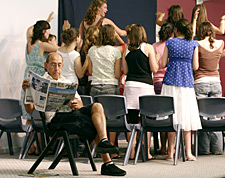This men's ministry seminars, Vince Williamson tells the story of a country pastor he knew who struggled to get men into church.
"One of the first duties the minister had to perform was the funeral of a very popular 18-year-old lad," he says.
"The whole town turned up to the funeral, and the church was full " of women. Not one man entered the building; they gathered outside. More than that, they wouldn't even stand on the church land. They lined up on the road with their toes to the kerb."
Why do Aussie men appear to hate church? Why do women flood into our ministries while men won't even step onto the footpath outside?
 Just 36 per cent of Australian Anglicans are men. Change your denominational shingle and the stats won't move much (see graph on following pages). Head to Britain and the United States and church leaders are grappling with the same question. So just what is wrong with the equation "church + blokes'?
Just 36 per cent of Australian Anglicans are men. Change your denominational shingle and the stats won't move much (see graph on following pages). Head to Britain and the United States and church leaders are grappling with the same question. So just what is wrong with the equation "church + blokes'?
The issue has sparked an array of seminars and books. The most well-known is the lively and contentious Why Men Hate Church, by red-blooded Alaskan David Murrow.
But the problem is not a new one. Cortland Myers insisted that the question of why men avoid church was "one of the burning questions of the hour" in his book Why do men not go to church? His book was published 108 years ago.
In the light of this fact, Ken Barbic from US church resource ministry 9 Marks concludes: "While various methods should change depending on the culture and context in which we minister, it is shortsighted and theologically misguided to believe that these are the primary impediments to men's acceptance of the gospel or attendance in the church. Instead, churches must continue to focus on the centrality of the gospel…"
Perhaps it's that Australia is less of a church-going society than America, but Barbic's advice seems to miss the mark for Vince Williamson's bush pastor and his church full of women. After all, what is it about the Australian "culture and context' that kept those men on the road and beyond earshot of the gospel message?
Murrow suggests the problem is that church has become "incongruous with manhood'. He laments with Charles Spurgeon that "there has somehow got abroad a notion, somehow, that if you become a Christian you must sink your manliness and turn milksop."
He suggests that the church has let men down; that men are drawn to risk, challenge and daring, but that churches have too often become oases of stability and predictability.
Church, he says, has become "a women's thing."
It's at this point that some will cry foul. A women's thing? Surely the opposite is true! Aren't churches male-dominated?
But Murrow argues that despite senior church leadership being overwhelmingly male, women make up a large proportion of key power players in church, and that most church ministry opportunities are more "feminine': singing, caring for children, or organising social gatherings.
Vince Williamson, 4WD accessories manufacturer and men's ministry strategist, points out that the job of reaching men is not about devaluing the service of women, but rather creating a church culture that welcomes both genders.
Not everyone is willing to take on board the "red-meat theology' Murrow takes from books like John Eldredge's Wild at Heart, and neither are his gender generalisations universal. There are many men who are far from a ute-driving, pie-eating picture of Australian masculinity.
But Murrow's principles offer much food for thought for a church culture with a dearth of active men. He suggests that Jesus' masculine side has been minimised in favour of a "tender, sweet man in a shining white dress'.
"Christ's bold, masculine command, "Follow me!', is now "Have a relationship with me.' We've recast Jesus' offer in feminine terms. Men want a leader, not a love object," Murrow says.
Yet, it is true that while Murrow's book deals with the practicalities of day-to-day ministry, he says little about the spiritual problems " pride, hard-heartedness or laziness " that keep men from church.
Aussie men need church because Aussie men need Jesus, Vince Williamson says.
"Men are looking for something solid, something meaningful," he says.
"We're living in a country which many people would consider to be paradise, but look at the high rate of male suicide. Men are looking for answers."























